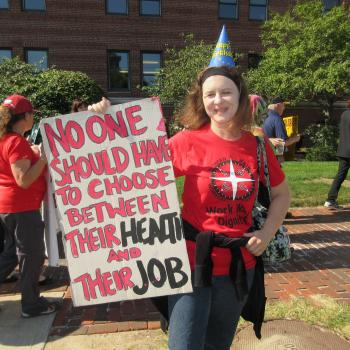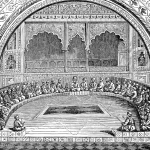Yesterday’s readings sent a resounding message to those of us Christians who live in prosperous times and in comfortable locales: Our neglect of the poor and debtors will not be forgotten by God. In his address before the Angelus yesterday, Pope Benedict XVI made numerous references to wealth and to capitalism in light of the first reading from Amos and the Gospel reading about the dishonest steward. Benedict XVI, who has been critical of free market economics both in his days as a theologian and in his statements as Pope, is something of an socio-economic enigma, having stated in his recent publication Europe that democratic socialism is very close to upholding the principles of Catholic social doctrine. The Pope strongly displayed his economic views this past Sunday, perhaps in a manner hitherto unseen, and it is clear that the simplistic caricatures we are spoon-fed in the corners of many of America’s Catholic institutes have been shattered.
Without question Pope Benedict XVI is strongly critical of Marxism in its totalitarian and materialist forms, and yet he has been no less critical of the capitalist vision espoused by many Western nations. Very often the terms of economic debate follow a framework of capitalism vs. communism without considering that both economic systems are based upon deficient anthropologies that serve as the bedrock for each system. Capitalism is grounded on an anthropology that stems from the works of David Hume, John Locke, J.S. Mill, Edmund Burke and Lord Acton. This anthropology denies any personal identity (i.e., there is no real self or person but only conscious events) and reduces the relations between de-personalized individuals to a matter of exchange–I will give you want you want and you will give me what I want. Communism is grounded on an anthropology that declares man to be nothing but a alienated material being whose sole purpose is playing a designated role in the historical progression and evolution of utopian society. Capitalism and communism, while varying in their concrete and practical faces, are very similar doctrines at their core as each subscribes to an attenuated anthropology.
Pope Benedict, aware of the deficiencies of this anthropology and of the primacy of capitalism in the West since the dissolution of Marxism in Europe, identifies two economic rationales that are operative in the West today: 1. “the logic of profit”; 2. “the logic of equal distribution.” Too often we hear that these two rationales are opposed (I am thinking of the Acton Institute here), yet the Pope declares that they need not be in total opposition. However, he does not envision some superficial Hegalian synthesis between them as if they are just two extreme positions that must be brought together into reconciliation. On the contrary, Pope Benedict XVI submits that the logic of equal distribution must precede the logic of profit, and that the latter must be subjugated to the former. What the Pope is describing here is a form of distributism that at the same time defies the unrestricted accumulation of wealth and the collectivism of communism. Profit is good for the development of peoples, but it must first submit to the equitable distribution of basic goods to all people before its benefits are actualized.
Capitalism is not to be considered the only valid form of economics, claims Pope Benedict XVI. The Holy Father–following closely his immediate predecessor–sees the historical result of unbridled capitalism to be the disproportion of quality of life between rich and poor and the destruction of the environment. Pope Benedict XVI proposes the sharing of goods and solidarity among peoples–two concepts utterly foreign to capitalism as a system–as solutions to this negative consumerist trend in the West. And yet, communism is not the solution. Rather, Pope Benedict XVI suggests that a “conversion” is needed–even among Catholics!–in order to rise above the rubble of capitalism and communism. A truly Christian socio-economic vision for the world is possible based upon the ethics and example of Christ, who enriched us with his poverty. You see, the giving of one’s self and the acts of selflessness do not terminate in the spiritual life, for man is not being detached from the world. Man is in the world, and his spiritual life is lived in human action (cf. John Paul II), which means his economic life is inalienably tied to his spiritual and moral life. Hence, the Church rightfully speaks out on economics, and perhaps no pope has done so as strongly as Benedict XVI, save Leo XIII.
Here is the Pope’s entire address from yesterday (I have bolded the points from which I drew my own analysis):
Dear brothers and sisters!
This morning I visited the Diocese of Velletri of which I was the titular cardinal for several years. It was a familial encounter, which permitted me to relive past moments rich with spiritual and pastoral experiences. During the solemn Eucharistic celebration, in speaking about the liturgical texts, I was able to reflect on the correct use of earthly goods, a theme that St. Luke the evangelist, in various ways, has brought to our attention over the last few Sundays.
In the parable of the dishonest, yet sharp steward, Christ teaches his disciples the best way to use money and material riches; share them with the poor and in this way earn their friendship, in view of the Kingdom of heaven. “Make friends for yourselves by means of unrighteous mammon,” says Jesus, “so that when it fails they may receive your into the eternal habitations” (Luke 16:9).
Money is not “dishonest” in itself, but more than anything else it can close man up within a blind egoism. What is needed therefore is a sort of “conversion” of economic goods: Instead of using them for one’s own interests, we need to also think of the necessities of the poor, imitating Christ himself, who, wrote St. Paul, “Though he was rich, yet for your sake he became poor, so that by his poverty you might become rich” (2 Corinthians 8:9). It seems to be a paradox: Christ did not enrich us with his wealth, but with his poverty, that is with his love that motivated him to give himself completely to us.
This could open up a vast and complex field of reflection on the theme of wealth and poverty, even on the world stage, in which two rationales regarding economics come face to face: the logic of profit and that of the equal distribution of goods, and one does not contradict the other, provided that their relationship is well-ordered. Catholic social doctrine has always sustained that the equal distribution of goods is a priority. Profit is naturally legitimate and, in a just measure, necessary for economic development.
John Paul II wrote in “Centesimus Annus”: “The modern business economy has positive aspects. Its basis is human freedom exercised in the economic field, just as it is exercised in many other fields (No. 32). However, he adds, capitalism is not considered the only valid model of economic organization (No. 35). The crises of hunger and the environment are denouncing, with growing evidence, that the logic of profit, if it prevails, increases the disproportion between rich and poor and a harmful exploitation of the planet. When the logic of sharing and solidarity prevails on the other hand, it is possible to correct the course of action and orient it toward proportional and sustainable development.
Mary Most Holy, who in the Magnificat proclaims: the Lord “has fed the hungry with good things, and the rich he has sent away empty” (Luke 1:53), help all Christians to use with evangelical wisdom, that is, with generous solidarity, earthly goods, and inspire governments and economists with farsighted strategies that favor the authentic progress of all peoples.
















